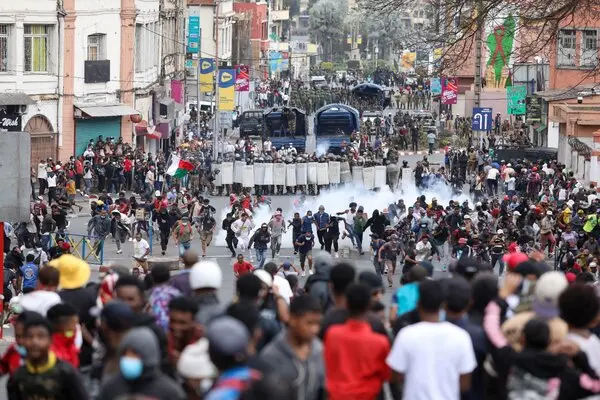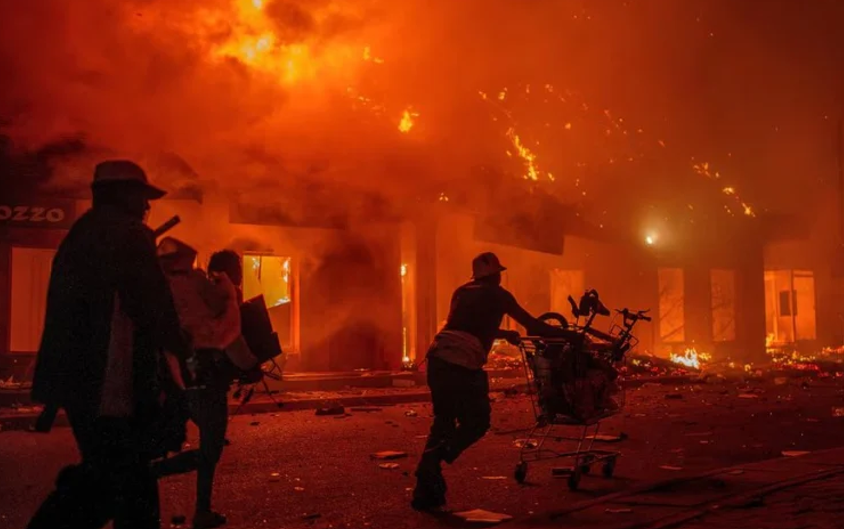“This feels like a preview for the future of our country.” After two days of what felt like quarantine all over again, I was walking to the grocery store with a fellow US American student studying abroad. She made the prior observation. We headed to a blue minimart, one of the only local stores not pillaged. Starting September 25th, students from the local university took the streets to protest the unfair living conditions in Madagascar. Crowds of youth, Gen Z specifically, started a peaceful protest against corruption in the government.
In 1960, the students of Madagascar took to the streets to protest the colonialist control of the French government. Their success is marked by Madagascar’s Independence Day, June 26th. Today, rhyming with the protests of 65 years ago, youth are in the streets fighting against governmental corruption. The current president and prime minister were put into place in 2018 (one presidential term in Madagascar is 5 years), despite the popular opinion being against both of the candidates. The president is a dual citizen, with nationality in France, he is considered “vasa” (a foreigner). In order to be the president of Madagascar, you are not allowed to have dual citizenship. It is important to note that the president does not have his baccalaureate degree, his job before presidency was as a DJ. “C’est les derniers qui dirigent le pays.” My host mom tells me, “It’s the last that leads the country.”
The media has named the ongoing protest, “Leo delestage” (translated, “Sick of power outages”). Throughout the whole country, neighborhoods and cities are hit with electricity and water shortages sometimes lasting over 12 hours. Many say it is because there is not enough water or electricity for everyone in Madagascar. However, one student in my study abroad group lives with a family using the same power line as the prime minister, and she tells me that she has never experienced a power outage.
There is not a shortage of wealth in Madagascar. The country makes up 50% of the vanilla trade. Every year, there are 150 million dollars of sapphire exports. On top of this, 312,000 tourists come each year to see the rich biodiversity, with 84% of species being endemic. In addition, Madagascar has countless other natural resources such as wood, coal, and agricultural land. Despite the billions of dollars made off of Madagascar’s natural resources and people, Madagascar is one of the poorest countries in the world. It is placed 177th out of the 193 countries, with 75% of the population living in poverty.
The site of the protests are in Antananarivo, commonly referred to as Tana, the capital of Madagascar, a major city estimated to have over 4 million people. Over the course of the past few days, central Tana has completely flipped. Neighborhoods, local shops, and supermarkets burnt to a crisp. The police turned their violence towards the peaceful protesters, yet when it came to looting, stealing and destroying, officers stood and watched. The important distinction is, however, that the looters aren’t protesters. They’re opportunists taking this as a chance to steal from and destroy nearby stores.
Outside my window, there’s a woman with a wooden plank full of new packaged snacks. A baby is wrapped in cloth and held to her chest. My host mom points her out to say she’s a looter. She explains that those are brand new market brand snacks, meaning she must have stolen them. Now, the woman, barefoot, balancing the wood plank on her head, calls out to incomers to sell the snacks.

Image Source: The New York Times
On September 26th, I spent the day next to the radio with a speech to a text translator. I heard cries of kids at a nearby children’s hospital being hit with the tear gas let off in the streets. I heard the chants of the unarmed students, “Mamono anay, mamono anay”, translated: “Kill us, kill us”, egging on the armed police. As I’m writing this, 5 innocents have been killed. Including a student from the University of Antsiranana who was sniped directly between the eyes. In response, the president returned to the country from being abroad (despite all international flights being canceled) and fired the minister of energy. He also established a city-wide curfew from 7PM to 5AM. The next day, I heard that police officers were told to switch their rubber bullets into real ones.
In my host family, the son in law is a police officer. From the start of the protest to now, almost 5 days, he has only been able to be home for two nights to see his kids. His job is the livelihood of the family, supporting a five year old, a seven year old, his wife, grandma and sister in law. Still, he opened his home to me, a study abroad student, to support my chance to learn about Madagascar.
The following Sunday, September 28th, a cool down, protesters regrouped as many observed the religious day. Many, including me, an atheist, decided to go to the local church. I took part in the church’s English language club. Only four of us made it in the group of over a dozen, due to fears of the ongoing violence. We translated Romans 8:13, “In all things, we are more than conquerors.” From there, we talked about resisting violence, and letting God take control.
The president released a statement, saying that it was safe to send your kids into school again, and not worry about the threats of a general protest on Monday. The city’s response: we’ll send our kids back to school when you do.
Monday, September 29th, there was a protest at the University of Ankatso joined by the surrounding neighborhood. The group was joined by the older generation, filled mainly with shop owners, angry at the inaction of police during the looting and burning of their livelihoods. The UN released a report stating that at least 22 people have been killed. That night, the president stepped forward and announced that he let go of his entire cabinet, including the prime minister.
Tuesday, September 30th, there was a gathering in a space previously left open for peaceful protests. The president, when he came into power, turned the lot into a garden. Now being swarmed for its original use, students and citizens, some having walked over 40 kilometers from a nearby town led by their mayor. That night, there was a rainstorm and an affront with police. The youth declared that they will not back down until the president resigns.
Thursday October 2nd, a joint statement between the embassy of Germany, Korea, France, the UK, Switzerland and the delegation of the European Union was released. The letter condemned the violence of the Madagascar government claiming, “these fundamental rights [of peaceful protest] are essential for democratic stability.” The US Embassy was unable to join the statement due to the government shut down.
Looking forward, there is no telling what will happen. But a group of students fed up with being denied their basic human rights were able to cause substantial fear and change in their government. Beyond Madagascar, youth continue to fight around the world against corruption. In 2025, the Nepal protests, started and led by Gen Z, drove their prime minister to resign and allow their first female prime minister to take charge. As well as the ongoing protests in Peru, driven by its youth. In 2024, youth-led uprisings in Bangladesh. In 2022, students led mass protests against the government in Sri Lanka. This highlights a trend; proving the power students have to make change.
I want to express that this is solely my experience and knowledge from a radio, a partially functioning tv, my host family and limited access to outside news. I encourage every student to inform themselves on the full extent of what’s going on. We are students living in a country with a ‘democratic’ government evolving to be a dictatorship. We need to pay attention, as it may be our turn soon.
By Kate Wisneskey ‘28
Featured Image Source: Reuters/Zo Andrianjafy

